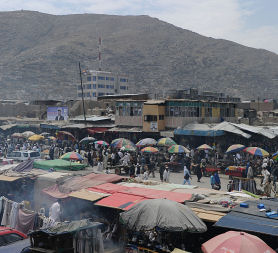Bomb squad - tackling Afghanistan IED threat
Updated on 11 February 2010
Insurgents are likely to use improvised explosive devices to counter the new British offensive in Afghanistan. Bomb disposal expert Captain Jon Evett recounts his personal experience leading a counter-IED team.

Captain Jon Evett commanded bomb disposal and search units in Helmand province in 2006. Now retired from the Royal Engineers, he works as a private security and resilience expert.
The MOD has this week announced the tragic death of another British soldier killed in Afghanistan.
Warrant Officer David Markland was a Royal Engineer Search Advisor (RESA) - killed on a route-clearance operation in Helmand province. As a senior ranking soldier and engineer with 20 years' experience, how is it that his role was as dangerous as any other?
The Royal Engineers, or Sappers, are a critical part of any force deployed on military operations. Their role is diverse and offers essential support to combat and stabilisation operations and further development.
Enabling our troops to manoeuvre in hostile terrain is a key function for the Sappers, who are trained in multiple disciplines: infantry soldier, combat engineer (bridging, mine warfare, booby-traps, explosive demolitions etc) and artisan tradesman (carpenter, welder, electrician etc).
One of the most critical tasks undertaken by the Sappers is route-reconnaissance, proving and clearance; ensuring our forces are able to move and fight and our logistic supply routes remain open. In Helmand province, a land with few roads, routes are easy to predict enabling the Taliban to target Nato troops, as we have seen, with sustained success.
Advanced equipment
Modern warfare is dominated by technology and may be waged at greater distances than ever before.
With greater range, accuracy and impact, advanced weapon systems have encouraged the vicious cycle of "better weapons, better armour" meaning that troops are better armed and protected than ever before.
If this is the case, why has technology not saved the UK from the loss of over 200 servicemen and women since operations began in Afghanistan in 2001?
Counter-insurgency operations are conducted amongst a functioning populace, within a society that can be both friendly and hostile.
Wading-in with the most powerful weapons will never achieve the aim and will only destroy any indigenous support that still exists. This means there is no dislocation or added protection; Nato forces are fighting an enemy that envelops them and is unidentifiable.
In this environment, the role of the Sapper as he progresses and is promoted is no safer. As a bomb disposal expert, the higher ranks are subject to the most risk.
As a design engineer and infrastructure expert, the most senior will need to visit a site to plan and design its development, before there is much comfort or protection in place.
Most of all, a High Risk Search Advisor's job title is not meant to be ironic.
These men and their teams are trained to actively seek danger; weapons cached, often booby-trapped and littered with unexpected dangers, such as venomous creatures and used hypodermic needles (used by Afghans, Iranians and Pakistanis all across the Golden Crescent); or buried at the side of the road whilst being watched by a Taliban bomber – thumb hovering over the remote control.
Once the threat of an IED is identified, the RESA and team deploy forward to protect their comrades.
Unprecedented and unpredictable
With manual techniques and detectors, there are no robots to be used yet, the search team locate and isolate the danger to minimize the risks to the bomb disposal expert. Sometimes multiple devices are placed to predict every movement Nato troops make, and hit them.
The searchers need to be one step ahead at all times in a game where there are no winners, only those who survive.
Operations in Afghanistan have developed significantly since 2001, particularly since the British Army’s deployment to Helmand province in 2006.
16 Air Assault Brigade arrived in the spring of that year with no clear mission statement and no tangible assistance from DfID and the FCO. This meant that operations were planned and conducted in a very fluid environment.
Royal Engineer search advisors and bomb disposal experts from both the Royal Engineers and Royal Logistics Corps had no precedents on which to base their planning – this theatre was not Iraq, or Northern Ireland and was nothing like the "spa town" that Kabul seemed in comparison.
The way the British Army employed military search operations had to be fundamentally revised.
The flexibility and resourcefulness of the RESAs were pivotal to the success of that tour, paving the way for how we see search conducted on operations today.
Where routes were used for the first time we enjoyed some unpredictability; as we became forced to used the same routes repeatedly, our movements were easily anticipated by the Taliban and the threat increased dramatically.
The RESA's job is to provide assurance; assurance to military commanders that a route is safe or if a compound contains weapons or bomb-making equipment, they will be found, confiscated and not be allowed to threaten civilians, Afghan security forces or coalition troops.
Such assurance takes time and that time is spent with the remainder of the troops static and vulnerable to attack - Operations Mutay and Mar-Chichel are evidence of this from summer 2006, as 3 PARA fought off savage and sustained attacks while search continued under consistent direct fire.
Even with 20 or more years experience there is no crystal ball to know what is lurking around the corner.
The Sappers' motto of "Ubique" is embraced as much now as ever - their role takes them "everywhere" on the modern battlefield as it always has.





